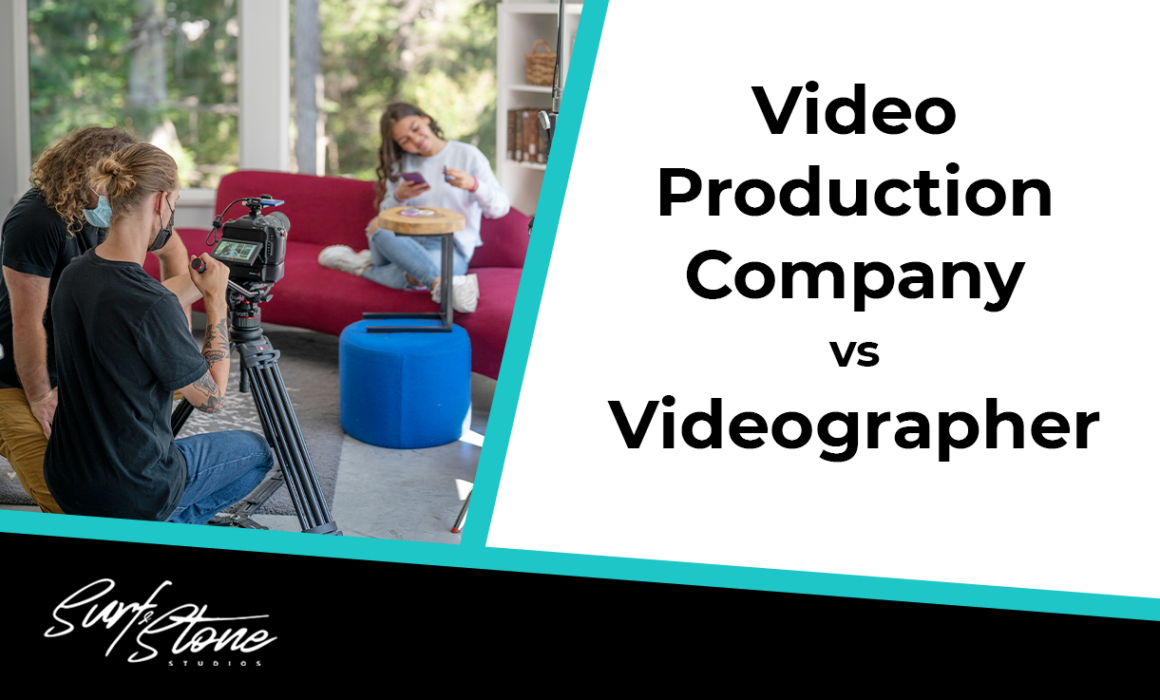VIDEO: Videographer vs Video Production
Do you need a video production company or a videographer for your business? The line between videographers and video production companies can be blurry, especially since many businesses operate somewhere in the middle.
When you’re trying to produce videos for your business, this can make it hard for you to know who to hire. It’s important for you to have a clear idea of what you want your video to accomplish before hiring anyone.
Once you have an idea of what challenges you want to address with your video, here are some things to consider when deciding who to hire.
We acknowledge that we live, work and create on the traditional territory of the Songhees, Esquimalt and W̱SÁNEĆ nations.
What is a Videographer?

A videographer is usually a one person camera operator who also provides editing. The price for videography is typically lower than a video production company since the scale of the production is smaller.
It used to be the case that videographers would cover events, weddings and small budget commercials with lower quality gear but now, high quality cameras are readily accessible and it’s made high production quality available at a much lower price point.
Videographers will typically be more of a one-man-band, even though they may have an assistant or second videographer on their team. They’re usually considered to be generalists and will handle everything from composition, lighting, sound, set design, and directing. This is a pretty heavy workload for one (or even two people) so you’re usually sacrificing in every department to keep the cost low.
What is a Video Production Company?

A video production company usually consists of a larger team of specialists. You’ll typically have a producer who will assemble a team to create and execute a vision, whatever that may be.
Since they’re operating with a larger team, it’s crucial that there is a set plan and strategic/creative vision for the production. This means that more attention will be spent on pre-production. Developing a concept, script, shot list and plan for the production are all integral steps that a video production company will provide.
On the production date, you’ll have a team assembled to execute the vision who have been assembled specifically for the project. If you’re shooting a product ad, you might have a specialist product Director of Photography (DoP) or if you’re doing interviews or studio work, a sound recordist might be brought on. The crew will be selected based on their specialization to achieve the best final video.
Cinematographers, Filmakers and Bears … Oh My!

You’ll also see a lot of freelancers who call themselves cinematographers, filmmakers, camera operators or even Directors of Photography (DoP or DP). What are these and how do you tell the difference?
A Director of Photography and Cinematographer are both the same job and have a lot of responsibilities on a film set. They’re typically responsible for directing the look and feel of everything in front of the camera alongside the director. A camera operator is essentially a videographer but their role can be more specialized on a film set. If you see someone call themselves a DoP or Camera Op, they’re likely looking to get hired by a production company to work on a set rather than get hired directly by a business.
When someone calls themselves a filmmaker, it’s usually used as a more general term for someone who can provide some or all of the roles on a film set.
Over the last several years, more and more freelance videographers are branding themselves as a filmmaker or a cinematographer without having the traditional experience of working as a DoP on larger sets. Although some traditionalists might dispute whether you can call yourself a DoP or Cinematographer without this experience, it’s more realistic to accept that these terms are becoming broader as the industry is evolving.
What’s the Difference?

The biggest difference between the two is that videographers will typically stick to what they can offer (their own style of filming and editing) while video production companies have larger networks and can provide a more diverse final videos (including: animations, special effects, documentary shoots, studio work, etc.).
Another big difference is the pre-production time in each project. Videographers will tend to film with less emphasis on pre-production. This can be beneficial if you’re hoping to reduce costs, but if you have a specific and targeted message that you need to convey it is crucial to have a script and shot list in advance. There’s nothing worse than having to reshoot a sequence that could have been captured on the production day. A good video production company will save you money in pre-production.
Price is usually another difference between the two, videographers typically charge less than a video production company but this is more tied to the size of the production. A larger videographer team may even charge more than a small video production company for some projects.
A video production company will typically produce the highest quality that they can within your budget, while videographers tend to add deliverables to fill your budget.
To boil down the difference between the two: a videographer will typically film action or activity while a video production company will design and craft what goes in front of the camera.
Important Considerations

Start by evaluating your options, these may be local companies or larger ones outside of your area if your budget allows. Look at their portfolios and pay attention to the style or the variety of videos that they’ve created. Take note of any options that stick out for you.
We’d also recommend thinking about your message. Is there a specific story or goal that you need the video to communicate? If so, we’d recommend narrowing your options down to the video production companies you like.
If you’re hosting an event or want to capture footage that is less structured (and requires less planning) then you can narrow down the options to videographers who have more event coverage in their portfolio. This could also be a good option if you need a large bank of footage for social media at a lower price point.
Finally, we recommend that you consider the importance of an event in making your decision. If you have an executive or a celebrity coming in to be on camera, you’ll definitely want to spend the money on a production company to plan and execute the video with confidence. These occasions normally don’t have a second chance so it’s crucial to execute on the production date.
Who Do I Hire?

Overall, it’s best to look through the portfolio of your options and decide which style and level of production you want. Feel out the candidates and ask them about their workflow to get an idea of who will work best with you.
Since there isn’t a defined line between a videographer and a video production company, it’s more important to make your decision based on their experience, portfolio, workflow and ability to deliver within your budget.


